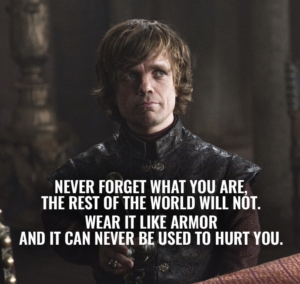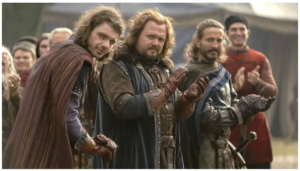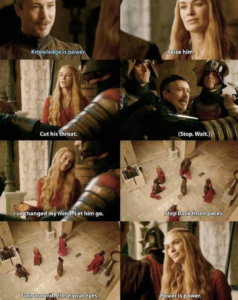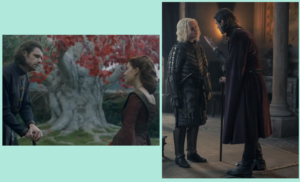Series Review
Larys Strong and disability in Westeros
Kshitij Pipaleshwar
Larys Strong from House of the Dragon is a man of many talents. From effortlessly blending in groups to being an unlikely shoulder for the newly disabled king to lean on, Larys managed to ascend the ranks without lifting a sword. This article is a closer look at Larys and his existence in the Westerosi society as a disabled person.
The house of Dragon just wrapped its second season, and the internet collectively has much to say about its slow pace, endless trippy dream sequences of Prince Daemon Targaryen (played by Matt Smith), the impromptu countryside escapade of the Dowager Queen Alicent Hightower (played by Olivia Cooke), and Princess Rhaenyra Targaryen’s (played by Emma D’Arcy) lack of action. As people start aligning themselves with either Team Black (wanting Rhaenyra Targaryen to be the next ruler of Westeros) or Team Green (rooting for Aegon Targaryen to succeed as Viesry’s rightful heir), fawn over Ser Simon Strong (him getting his priorities right- good food, good clothes, unwillingness to preside over the cursed castle of Harrenhal), and complain about how no one has reprimanded Rhaenys yet for the death and destruction she caused at Aegon’s crowning ceremony (but hey they were commoners/small folk so no one cares!), there has been a growing interest in the development of three of its characters – Larys Strong, Helaena Targaryen, and Aegon Targaryen. While Larys and Aegon are shown to have physical disability, Helaena is portrayed to be coded with intellectual disability. Of these three, Larys Strong is the character of choice for this article.
George R.R. Martin (the writer on whose books the series is based) is not one to shy away from disability. In his universe, both in A Song of Ice and Fire (ASoIaF) and House of the Dragon (HotD) disabled characters exist, and not just exist, they flourish.


From Bran Stark to Jamie Lannister, and Tyrion Lannister to Hodor, Martin has not shied away from having a plethora of characters who stand out in his mediaeval fantasy world. And these are not just token characters fulfilling their diversity quota in the series, these are well written, fully fleshed people, and absolute fan favourites. The quote in the photo by Tyrion Lannister (the quick wit, sharp, intelligent, cynical, and much despised scion of House Lannister, also happens to be a man of short stature) finds its fame as one of the most memorable lines of the series, inspiring people to embrace their shortcomings and flaws, not be embarrassed about them.
Similar to ASoIaF, in the world of House of the Dragon, a character could be disabled from birth (Larys Strong played by Matthew Needham) or develop it later in their life (Aegon Targaryen II played by Tom Glynn-Carney). A quick, right-thumb rule to assess how does an author/filmmaker represent disability is to ask :
Is the character extremely inspiring/evil/saint-like-innocent because they are physically/mentally disabled? If the answer to any permutation-combination of this question is Yes, then one can safely assume that a positive representation of disability is severely lacking in the text.

In the patriarchal, masculine world of HoD, Larys with his clubfoot (a condition he is born with), does not fit the mould of a fit-able-sword wielding man who can win tourneys, and bring his house honour and glory. He is frail, does not look intimidating, and is disabled. On Aegon’s nameday as the knights and lords gather in the woods to hunt, Larys politely inquires if he can join Alicent and other noble ladies as they sit and engage in ‘frivolous conversations’. He manages to inconspicuously ingratiate himself with the ladies, empowering himself with information that is passed through the gossip network.

This exchange between Cersei Lannister and Petyr Baelish best exemplifies how Power works in Westeros, so it is no coincidence that while Larys’s brother, Harwin Strong (also the father of Rhaenyra’s children) is known as the strongest man in the seven kingdoms, Larys derives his power from information he manages to learn. From choosing to divulge information to win the Queen Alicent’s favour to appeasing Aegon’s ego, Larys steadily climbs rank to be named as the Master of Whispers by Aegon and becomes a part of inner council.
Larys is not a likeable character. He is shrewd, enjoys torturing prisoners, even manages to get his own brother and father killed to get them out of the way, and for them to stop being a threat. The death of his father and brother also ensures that he is the Lord of Harrenhal (the largest castle in Westeros).
But do we not like him because of his disability? No.
Is him being disabled the reason we are not rooting for him? No.
Is him being disabled the reason we are rooting for him? No.
Is he a 100% evil character with absolutely no redeeming qualities? No.

The audience does not like him because he, like all the characters in the series, is indulging in morally reprehensible acts. It is hard to root for any character or faction in the show, as validated by the actor Rhys Ifans (plays Ser Otto Hightower) who when asked which faction does he support responded, “Both sides are crazy war criminals. So I think we should all enjoy seeing how they die”.
In a world that values the display of strength and valour, Larys grew up with an understanding that his clubfoot is a limitation for him, and he learnt to use it to appear non-threatening. Larys manages to win himself some empathy as he puts himself in service of wounded Aegon. Larys recounts how he was born with a clubfoot and his father (Lyonel Strong) accused the witch, Alys Rivers, of cursing him with this condition. Larys’s mother died during childbirth, and he grew up being very aware that he will not be taken seriously because of his condition, so he learnt how to use the disability to his advantage. He tells Aegon (who is struggling to come to terms with his own disability) that disability changes how people will perceive him, how they will underestimate him, and how this can be advantageous.
While one might find themselves understanding the motives behind Larys’s action, there is nothing inspiring about him (and as all the characters are quite enthusiastic about a civil war, none of them are remotely inspiring). The game is about winning power and being in its proximity, and Larys has managed to clamour close to it, not by being a knight or being known for his justness/fairness/legal expertise, but by gathering intelligence simply by being unnoticed as a harmless clubfoot.
The scene that does not sit well with Larys’s depiction of a-fully-formed-character -and-not-just-limited-to-his-disability is the scene in episode 9, season 1, where he masturbates to Alicent’s feet. It feels quite reductive that the show runners portray a character who lacks mobility to have a foot fetish. The actor, Matthew Needham, has a different take on this. According to him this is about power dynamics and sexual assault. It is about the shame Larys wants Alicent to carry as her body is the site where the violence takes place. This interpretation of the scene, while not wholly impossible to ascertain, does not come across as strongly as the showrunners might believe.
It should also be noted that while Matthew Needham is a prolific actor, he does not suffer from any known disability.
As one advocates for better, more diverse representation of disability, and disabled characters that explore the whole spectrum of their humanity- from good, to grey to villainous, a character as well written as Larys Strong does seem like a step in the right direction. Larys is a person. In a power hungry, glory seeking world of Westeros that respects only gold, strength, and battle wins, he learns to play the game by using his limitations to his advantage. He chooses to employ his limitations strategically. He decides the level of threat (or the lack of it) he wants to project.
Is he winning any hearts, being the poster boy of ‘Don’t be held back by your disability?’ – No
Is he made to look evil/sinister because he is a disabled? – No
He is the only one trying to keep a wounded Aegon safe and at the same time does not think it is important to let the ruling regent (Aemond Targaryen) know that the opposing faction has new dragon riders.
He is flawed. He is human.
George R.R. Martin and the showrunners managed to make him a character of intrigue, one that we shall be keeping an eye on in the seasons to come.